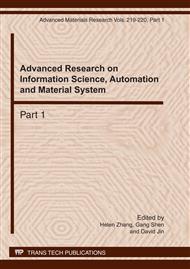p.1528
p.1533
p.1537
p.1541
p.1545
p.1550
p.1554
p.1558
p.1565
Privacy Preserving Coordinated Inventory Replenishment Policies in a Multi-Stage Supply Chain
Abstract:
Most of the CRE solutions either assume existence of a central planner who has all the information about the system, or assume that each participant of the computation shares all of his information with other participants. These solutions, however, are problematic when the data is sensitive and the participants are reluctant to share their private, proprietary information. The development and deployment of privacy preserving coordinating model in supply chain based on common replenishment epoch could allow supply chain collaborations to take place without revealing any participant's data to the others, reaping the benefits of collaboration while avoiding the drawbacks. In this paper, secure multi-party computation protocols are applied in the problem of a multi-stage supply chain, where the objective is to find a CRE policy for each facility in the system such that the total average ordering and inventory-related cost of the entire system is minimized.
Info:
Periodical:
Pages:
1545-1549
Citation:
Online since:
March 2011
Authors:
Price:
Сopyright:
© 2011 Trans Tech Publications Ltd. All Rights Reserved
Share:
Citation:


